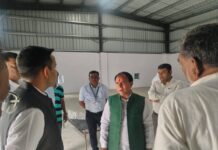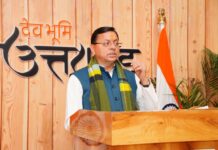
Dehradun – The 12th day of the Virasat Art and Heritage Festival 2023 kicked off with the Master Craftsman Workshop, an event tailored for school and college students, thoughtfully organized by Ghanshyam Ji and Kalpana Sharma. This educational endeavour saw the participation of three schools, one college, and one trust: SGRR Public School Balawala, Doon International School, Latika Foundation, Aasra Trust, and BS Negi Technical Training Institute for Women. A total of 110 students immersed themselves in creative exploration, learning pottery making, natural and synthetic tie and dye, mask making, hill art, and cubic solving, all under the guidance of expert instructors.
Today’s cultural festivities began with ceremonial lamp lighting, graced by Mukesh Singh IPS IG, ITBP, and REACH Heritage General Secretary Shri RK Singh, along with other distinguished members.
The first cultural presentation featured “Gabarghichor,” a captivating play from Bihar’s renowned ‘Bhikhari Thakur Rangamandal.’ The talented cast included Jainendra Dost as Panch, Rahul Kumar as Gabarghichor, Galij Bahu in a crucial staging role, Sunil Gavaskar as Galij, Naman Mishra as Ghadali, Dharamraj as Hangman, Ramlakhan as Fuhri and Samaj, Brijnath Singh as a versatile performer in both Dance and Samaj, Ravindra Patel, who also contributed to Dance and Samaj, and Gauri Shankar showcased his mastery of the Harmonium. Sandeep Kumar handled the Dholak, Shiv Kumar managed the Sound and Light Arrangement, Ranjit Bhojpuria was responsible for the Stage Arrangement, and Sarita Saaz provided the enchanting Music and Appearance. The play was brilliantly directed by Dr. Jainendra Dost.
“Gabarghichor” is a celebrated folk play by Bhikhari Thakur, serving as a sequel to “Bidesiya.” It unfolds as a musical drama, delving into themes of displacement, particularly the challenge of a husband who forgets his wife due to displacement. Significantly, the play champions women’s rights, focusing on a mother’s influence over her son, challenging male-dominated norms. The performance incorporates various dance and singing styles from the Purvanchal region, such as Janghiya dance, Eastern song, Doha, Chaupai, Vilap Geet, Nirgun Geet, and more.
Dr. Jainendra Dost is the visionary founder director of the “Bhikhari Thakur Rangamandal Training and Research Centre,” dedicated to revitalizing the theater, music, dance, and instruments associated with Bhikhari Thakur, a folk artist and Bihar’s cultural treasure. His relentless efforts have breathed life into the plays of Bhikhari Thakur’s former dance troupe. Jainendra Dost’s academic background includes theater studies at the Theater and Film Department of Hindi University, a Ph.D. on Launda Naach and Bhikhari Thakur in the Department of Art and Aesthetics at Jawaharlal Nehru University (JNU), Delhi, and valuable insights gained from Bhikhari Thakur’s stage partner, Padmashree Ramchandra Manjhi. He has directed over 15 plays and showcased his dramatic and musical creations not only at esteemed national theater festivals but also on international stages in countries like Pakistan, Sri Lanka, Nepal, and Bhutan. Most recently, he achieved international recognition with the film “Nach Bhikhari Naach,” celebrating Bhikhari Thakur’s theatrical legacy.
“Bhikhari Thakur Rangamandal” is more than a professional theater; it represents a cultural institution dedicated to the preservation, training, and research of Bhikhari Thakur’s theatrical traditions. It serves as a home for all living artists who were mentored by Bhikhari Thakur and were part of his troupe. This institution strives to rekindle Bhikhari Thakur’s theatrical legacy in its entirety. With a repertoire that includes plays like Bhikhari Nama, Bidesiya, Gabarghichor, Betibechawa, Piya Nisil, Ganga Snan, and more, the center remains committed to ensuring the continuity of Bhikhari Thakur’s theatrical traditions across generations.
The festival’s second presentation featured sitar virtuoso Purbayan Chatterjee, who embarked on a soul-stirring journey with Raga Manoranjani, expertly exploring Madhya and Drut Jhap Taal, seamlessly blending traditional Indian classical music with contemporary world music influences.
Purbayan Chatterjee, a renowned Indian sitar player, is celebrated for his innovative approach, fusing traditional Indian classical music with global influences. He is a multifaceted artist who not only excels as an instrumentalist but also as a singer and performer. Purbayan Chatterjee’s prodigious talents earned him accolades such as the President of India Award, the Aditya Vikram Birla Award, and the Kitchen Award by Rotary International, establishing him as a respected figure in the realm of Indian classical music.
The festival’s third presentation featured a ghazal performance by Radhika Chopra, enchanting the audience with the timeless verses of poets like Ghalib, Faiz, and Iqbal. Radhika’s soulful renditions included Ghalib’s poignant “Ronon se aur ishq mein beko babak” in Raag Nand, followed by Allama Iqbal’s passionate “Tere ishq ki intiha chahta hoon” in Raag Desh. Sahir Ludhianvi’s evocative “Tum Apna ranj gham” in Raag Pahadi, Ali Ahmed Jalili’s mesmerizing ghazal “Khushi Mein Mujhko Thukraya” in Raag Malhar and Raag Malkauns, and Faiz Ahmed Faiz Sahab’s reflective “Raaz e Ulfat Chupa Ke Dekh Liyakri” were performed, accompanied by Murad Ali on Sarangi, Amjad Khan on Tabla, and Nafees Ahmed on Harmonium.
Radhika Chopra, a renowned Indian ghazal singer, holds a Master’s degree in Hindustani Music and has been recognized for his excellence and melodious voice. With a crisp and clear vocal style and proficiency in both Hindi and Urdu, Radhika has earned the admiration of audiences worldwide.
The festival also featured tabla maestro Shubh ji, hailing from a family deeply rooted in music. Shubh, the grandson of tabla player Shri Kishan Maharaj and the son of the famed Kathak dancer Mr. Vijay Shankar, carries forward the musical legacy of his forebears. Trained under his maternal grandfather, Pandit Kishan Maharaj, Shubh’s journey in tabla began at the tender age of 12. He went on to perform across India, earning the privilege of accompanying luminaries like Padma Vibhushan Pandit Shiv Kumar Sharma and Ustad Amjad Ali Khan. Shubh has graced prestigious stages, including Saptak (Ahmedabad), Sankat Mochan Mahotsav (Varanasi), Ganga Mahotsav (Varanasi), Baba Hariballab Sangeet Mahasabha (Jalandhar), Spike Mackey (Kolkata), and Bhatkhande Sangeet Mahavidyalaya (Lucknow).
The Virasat Art and Heritage Festival 2023, taking place from October 27 to November 10, provides a captivating platform to experience the rich tapestry of art, culture, and music presented by distinguished classical maestros. The festival promises an array of attractions, including a crafts village, culinary delights, an art fair, folk music, Bollywood-style performances, heritage walks, and more. It offers a unique opportunity for people across the country to immerse themselves in India’s rich cultural heritage. Every facet of the festival, from art exhibitions to musical performances and heritage walks, embodies the cherished values associated with Indian heritage.
Established in 1995, REACH has been a dedicated steward of India’s art, culture, and heritage. Organizing the Virasat Mahotsav in Dehradun, REACH’s mission is to preserve and propagate the cultural values of India. The Heritage Festival has played a pivotal role in reviving endangered rural arts, including music, dance, crafts, painting, sculpture, theater, storytelling, and traditional cuisine. This revival has breathed new life into classical and contemporary arts, gaining recognition on a global scale.
Virasat 2023 promises to transport attendees on an unforgettable journey through the mesmerizing realms of music and culture.












